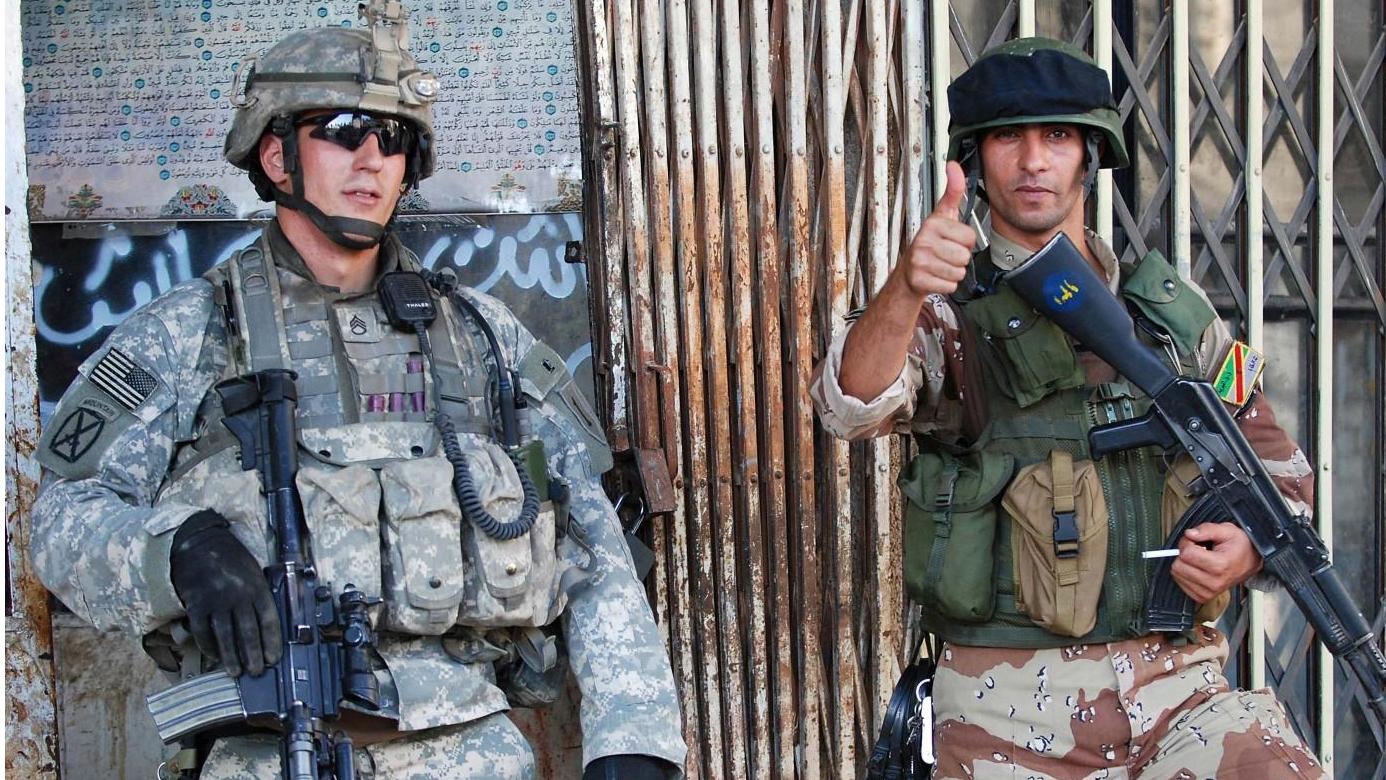The military is going beyond PTSD to help soldiers who have suffered a ‘moral injury’
Army Sergeant First Class Robin Johnson and a member of the Iraqi army.
The trailer for the new Peter Berg movie “Lone Survivor” says it all: for soldiers, there are decisions that truly change your life.
In one scene, the small Navy SEAL team assigned to kill an al-Qaeda leader is surrounding a young Afghan goat-herder in the middle of the Hindu-Kush Mountains. Taylor Kitsch’s character says, “The way I see it, we got two options: one, let 'em go, roll the dice. The second that they run down there, we've got 200 on our backs. Two, we terminate the compromise.”
Mark Wahlberg’s character cuts in: “…Not killing kids, not feeling it. This is not a vote, we're gonna cut them loose and we're going home.”
Those choices often haunt veterans for the rest of their lives. Today, officials in the Department of Veterans Affairs say psychological damage from particularly egregious war violence — like killing children or seeing friends killed — can create an affliction of the soul. And they call it moral injury.
Serving in Operation Iraqi Freedom in 2004, Army Sergeant First Class Robin Johnson's platoon was running a routine checkpoint, hoping to nab people carrying car bombs or explosives in their vehicles. Suddenly, Johnson says, a car comes out of a side street and speeds up, heading straight towards them.
“The window [of time] of signaling shooting for a warning shot, shooting to disable and then engaging can be milliseconds,” he says. “You have to make that judgment call of ‘Is this a threat?’”
Johnson's platoon engages. He's one of the first to fire.
“Once it was done … it was just a family. You know, a mother, father and infant, in the mother's lap, and then two little girls in the back seat,” he says.
Johnson re-lives that day over and over again in his mind, and often finds himself angry at the father driving the car.
“You know, 'why didn't you just stop, like, why didn't you stop?'” he asks. “What was his logic? Was he trying to get down the next side street? Did we scare him? What was going on in his head at that moment? Now, this whole family is gone — they got up that morning and they ate breakfast together, they talked and they laughed and they planned out their day, and now, they're gone.”
Retired Navy psychiatrist William Nash says, “What makes a warrior a warrior is taking personal responsibility. And when they fail to live up to that enormously high ideal, that's moral injury.”
Nash helped pen the latest version of the Navy and Marine Combat Operational Stress Control doctrine — basically, the military’s mental health bible. Nash says the doctrine includes, for the first time, the concept of “damage from moral injury” within a post-traumatic stress disorder (PTSD) diagnosis.
And it wasn't an easy call for therapists. He says it means "asking veteran service members, after they come back from a war zone, about events where they did things that maybe they were told to do — maybe they had to do that in the context of a crazy counter-insurgency war — were the right thing to do, that they now feel were unacceptable, unforgivable.”
Nash says the idea, acknowledgement and even the words are a hurdle for the military. But by acknowledging that moral injury is something unique, the military can work on creating a unique treatment for it.
Generally, soldiers suffering from PTSD feel anxious or afraid. That fear can take over their lives. Brett Litz, a psychologist with the Veterans Administration in Boston, says moral injuries occur less from fear and more from loss — specifically violent, traumatic loss.
“These morally injurious experiences are particularly scarring because they're associated with shame and guilt and feeling that you're not entitled to get better and to live a good life — and not something you can just get back on the horse about. It's not something that's easy to talk about. So loss is a very important and [a] separate, potential harm for service members in war.”
To combat this harm, the VA created something called Adaptive Disclosure Therapy, or ADT. It's relatively short — approximately six sessions. At one point during this type of therapy, soldiers are asked to re-live their most disturbing experiences. They must close their eyes and imagine they're speaking to an unconditionally-loving and non-judging person. Litz says early results from a trial using Marines at Camp Pendleton in southern California are encouraging. But therapy is just the beginning.
“We're not healing people, we're just starting a healing process,” says Litz.
Another problem with moral injury is that soldiers don't really like to talk about it.
Sergeant First Class Robin Johnson is now 34. He served three tours in Iraq and two in Afghanistan. He says events like the killing of the family in 2004 are chewed over and judged by a public that has no concept of the battlefield. So Johnson talks only to a few people about the worst of what he's seen and done — mostly to soldiers who were there.
“I don't think people can possibly understand,” he says. “You keep fighting, but you know, it's hard to explain. We joke about it a lot. We kind of make jokes of it — that we're not human anymore. Like the humanity is dead in us.”
Only a handful of people in the VA and the military pushed to have the phrase "moral injury" officially used in diagnosing some forms of PTSD. But now the Department of Defense is conducting a larger clinical trial. Advocates of "adaptive disclosure" argue that the military will need the same kind of courage it takes to fight on the battlefield if it hopes to find treatment for the kinds of deep, psychological wounds service members face today.
